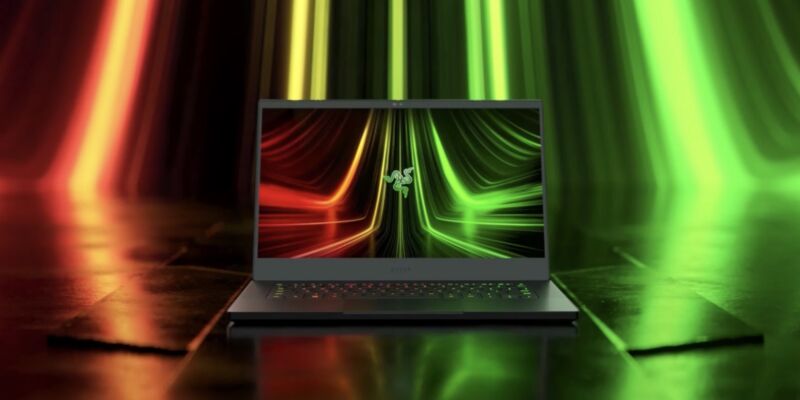
Enlarge / Razer's newest Blade 14 laptop is getting a spec bump via firmware. (credit: Razer)
Owners of the latest Ryzen 6000-based version of Razer's 14-inch Blade laptop are getting a significant update soon: The company confirmed to The Verge that a BIOS update for the laptop would add USB 4 support to its USB-C ports, doubling the transfer speeds from 20Gbps to 40Gbps and adding support for high-bandwidth, Thunderbolt-compatible external accessories like external GPU docks.
USB 4 is kind-of-sort-of feature compatible with Thunderbolt, the spec that Intel made royalty-free back in 2019. Like Thunderbolt 3 and 4, a fully enabled USB 4 port supports data-transfer speeds of up to 40Gbps and PCIe tunneling for support of external GPUs and other high-speed accessories. Some USB 4 ports only support the spec's minimum speed of 20Gbps, the same speed as USB 3.2 Gen 2, but Razer's ports do appear to be fully enabled 40Gbps ports.
Razer isn't doing anything particularly special to boost its USB speeds. Rather, it's taking advantage of the USB 4 capabilities that are built into all Ryzen 6000 processors. As long as a laptop's manufacturer has included the hardware necessary to support USB 4 speeds, any manufacturer can "upgrade" to USB 4 via a firmware update and a chipset driver that AMD released over the summer. PCWorld tested Ryzen 6000's USB 4 support on an Asus ZenBook that also required a BIOS update before it supported the feature.
Read 2 remaining paragraphs | Comments

Enlarge / Razer's newest Blade 14 laptop is getting a spec bump via firmware. (credit: Razer)
Owners of the latest Ryzen 6000-based version of Razer's 14-inch Blade laptop are getting a significant update soon: The company confirmed to The Verge that a BIOS update for the laptop would add USB 4 support to its USB-C ports, doubling the transfer speeds from 20Gbps to 40Gbps and adding support for high-bandwidth, Thunderbolt-compatible external accessories like external GPU docks.
USB 4 is kind-of-sort-of feature compatible with Thunderbolt, the spec that Intel made royalty-free back in 2019. Like Thunderbolt 3 and 4, a fully enabled USB 4 port supports data-transfer speeds of up to 40Gbps and PCIe tunneling for support of external GPUs and other high-speed accessories. Some USB 4 ports only support the spec's minimum speed of 20Gbps, the same speed as USB 3.2 Gen 2, but Razer's ports do appear to be fully enabled 40Gbps ports.
Razer isn't doing anything particularly special to boost its USB speeds. Rather, it's taking advantage of the USB 4 capabilities that are built into all Ryzen 6000 processors. As long as a laptop's manufacturer has included the hardware necessary to support USB 4 speeds, any manufacturer can "upgrade" to USB 4 via a firmware update and a chipset driver that AMD released over the summer. PCWorld tested Ryzen 6000's USB 4 support on an Asus ZenBook that also required a BIOS update before it supported the feature.
Read 2 remaining paragraphs | Comments
November 16, 2022 at 10:33PM

Post a Comment